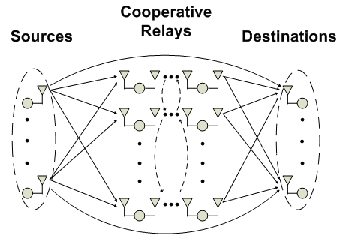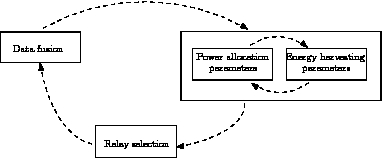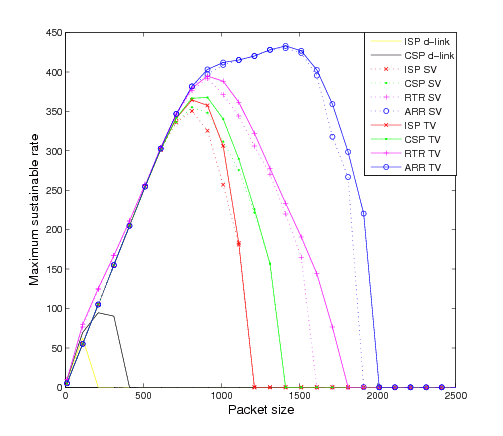Cost Effective Design and Performance Evaluation for Cooperative Wireless Sensor Networks
Recently, wireless sensor networks (WSNs) have been proven extremely powerful because of their unique features that allow a wide range of applications in the areas of military, environment, health and home. WSNs are usually composed of a large number of densely deployed sensing devices which can transmit their data to the desired destination through multihop relays (see Figure). As sensor nodes carry limited, in general irreplaceable power sources, one of the most important constraints for WSNs is the low power consumption requirement. Thus, power conservation is of tremendous importance.

General Tasks
The focus of our research is on WSNs and the need for cost effective solutions, increased capacity and enhanced performance for data fusion and processing. We consider WSNs that operate in a cooperative way with two or multiple hops. The sensor nodes are battery powered, have a limited lifetime, reduced communications and data processing capabilities. Therefore, a major focus is on low-energy solutions. The aim of our research on algorithms, designs and strategies for WSNs is to achieve high performance by still reducing the power consumption. As a result, the network lifetime will be extended and data processing capabilities will be greatly enhanced. Current topics are:
- Low-complexity Channel Estimation
- Joint Design Strategies with Resource Allocation
- Analysis of Relaying Strategies and Protocol Design
Low-complexity Channel Estimation
For this topic, we focus on low complexity channel estimation methods for WSNs. Because most of the research on other layers are based on the assumption of perfect synchronization and available channel state information (CSI) at each node, more accurate estimates of the CSI will bring better performance for WSNs. We investigate the set-membership filtering (SMF) framework and incorporate it into the conventional channel estimation algorithms such as least-mean-square (LMS), recursive least-square (RLS), conjugate gradient (CG), affine projection (AP) and date reusing algorithms, etc. These set-membership channel estimation algorithms can reduce the computational complexity significantly and extend the lifetime of the WSN by reducing its power consumption.
Joint Design Strategies with Resource Allocation
For this topic, we investigate strategies to jointly design resource allocation, data fusion, relay selection strategies, and energy harvesting (see Figure). The aim of our research is to improve the performance under the constraint of the limited power consumption of the sensor nodes.

Analysis of Relaying Strategies and Protocol Design
- Analysis of QoS-constrained performance
It has been proved in many research works that Multi-relay Cooperative Automatic Repeat reQuest (CARQ) is a promissing way to improve the efficiency of retransmission and to reduce the delay of transmission. Based on approximate queueing theory, we derive the expressions of delay distribution and effective capacity (with target requirements of delay and delay violation probability) for common CARQ protocols. Please see Figure for the validation.

- Energy-efficiency-oriented packet drop mechanism For the feedback-limited system, we design a distributed way to reduce the potential waste of energy by conditionally introducing a packet drop mechanism to relays.
- Energy-efficiency-oriented CARQ protocol design We analyze the energy efficiency of common CARQ protocols by theoretical means. Our focus is to design an effective and efficient CARQ protocol to maximize the energy efficiency of the system.
Related research topics and publications
- T. Wang, R. C. d. Lamare, A. Schmeink, Joint Linear Receiver Design and Power Allocation Using Alternating Optimization Algorithms for Wireless Sensor Networks, IEEE Transactions on Vehicular Technology, vol. 61, no. 9, pp. 4129-4141, September 2012.
- T. Wang, R. C. d. Lamare, A. Schmeink, Joint Maximum Sum-Rate Receiver Design and Power Allocation Strategy for Multihop Wireless Sensor Networks, Proceedings: IEEE International Conference on Acoustics, Speech, and Signal Processing (ICASSP), Kyoto, Japan, March 2012.
- T. Wang, R. C. d. Lamare, A. Schmeink, Joint Receiver Design and Power Allocation Strategies for Multihop Wireless Sensor Networks, Proceedings: International Symposium on Wireless Communication Systems (ISWCS) 2011, Aachen, Deutschland, November 2011.
Related projects
- Analysis of Relaying Strategies and Protocol Design is a joint research project with James Gross from KTH, Sweden.
Contact
For further information contact- Tong Wang for Channel Estimation and Resource Allocation
- Anke Schmeink for Channel Estimation and Resource Allocation
- Yulin Hu for Relaying
***
Aktuelle Informationen gemäß Art. 13 DS-GVO:
Datenschutzhinweis ***
Impressum ***

